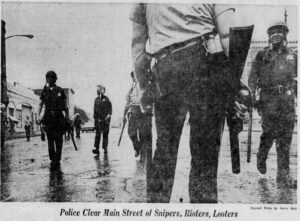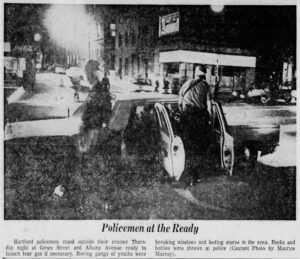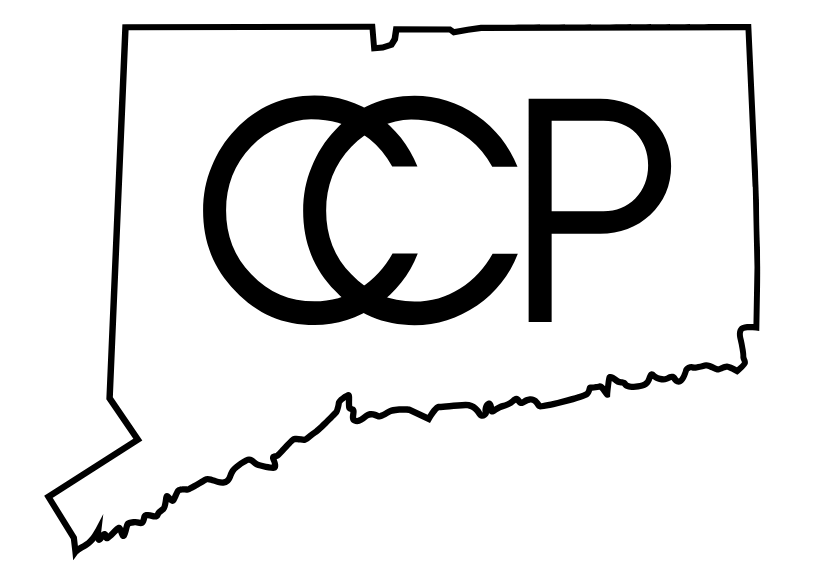James McMillan

Incident: Around 1 pm on May 3rd, 1971, Bristol Police Sergeant Raymond Donaghy and Officer Thur Hewitt were notified of suspicious persons in a blue car near the Western Auto Store on Pine Street. Upon entering the area, they were notified about shoplifters at a nearby retail store. They noticed a blue car nearby with two men and two women inside, and searched the vehicle. Upon finding stolen goods, the officers asked the driver, Hartford resident James McMillan, for his ID. McMillan provided it and then ran away down Valley Street. Hewitt called out to McMillan to halt twice, fired a warning shot into the air, and then shot him in the back from thirty-sixty feet away. The bullet entered McMillan’s heart and killed him instantly.
Suspension: Around one hundred people began protesting outside of the Bristol Police Department (BPD) two days later, calling for Hewitt’s suspension until the investigations ended. Mayor Norton held a meeting with BPD’s Chief Mead, members of the Board of Police Commissioners and “the Black community” and decided to suspend Officer Hewitt for the duration of the shooting investigation. Norton assured the public that this decision was not made in the face of pressure from protestors, but was in the interest of protecting Hewitt.
By May 6th, the Board of Police Commissioners voted unanimously to suspend Hewitt without pay because he had violated a general directive issued to all policemen in 1968 regarding the use of deadly force. The directive said “the only time a shot will be fired is in defense of your own life, someone else’s life or making an arrest of a dangerous felony.”1 This policy differs from that of Hartford, which allows deadly force to apprehend any felon whether or not they have committed a violent crime (See Dennis Jones; Coroner’s Report.) Although the stolen goods in McMillan’s car added up to $50, constituting a felony, he was clearly not dangerous; however, there was still doubt which the coroner’s inquest would settle. Demonstrations ended upon hearing official word of Hewitt’s suspension.
The department told the public that needle marks were found on McMillan’s arms and a syringe in his pocket. A blood sample was sent out to be tested for drugs. The connection this could have to the case is unclear, beyond an unveiled attempt to deride McMillan’s character.
The local Human Rights Commission (HRC) held several meetings in the weeks after McMillan’s death, attended by Mayor Norton, Chief Mead, the police commissioners, and Bristol citizens. These meetings were held at late hours and were full of shouting. On May 12th, Norton said the HRC’s recommendations were being considered, and that some—such as a community relations commission—were already underway. The city agreed to allow two “spokesmen for the Black community” access to police files and progress during the shooting investigation, but in practice made this access quite difficult. 2
Firing warning shots was also against the BPD’s policy on firearms, but this was not remarked upon much in the proceedings following the shooting. The Hartford Courant learned that the BPD had not had mandatory pistol practice in seven months prior to the shooting. Department regulation required that each police officer practice at least twice a month, firing a minimum of thirty six shots.
Community Response: Two community organizations were formed in the wake of McMillan’s death: Thur Hewitt Assistance Team (THAT), and the Bristol Citizens Concerned with Justice and Brotherhood (BCCJB). THAT aimed to raise $20,000 to support Hewitt and his family during his unpaid suspension. They raised $6,000, which was matched by the police union.
The BCCJB, named after an MLK quote, was led by George Springer. Springer was a high school history teacher and former head of the local Human Rights Commission, which he left over a disagreement over the organization’s limited powers; it did not have a staff. The BCCJB held weekly meetings and organized a memorial for McMillan on May 23rd, near the street where he died. The event was followed by an auto procession to Beulah AME Zion Church for a discussion of “the elimination of the conditions in Bristol that led to the death of James McMillan.”3 City officials were invited but did not attend.
In July of 1971, Springer was elected to the Democratic Town Committee, its only Black member. During his acceptance, he expressed the need for new directions and communication channels; “I may be representing people who have not had a voice.”4 Springer met with Mayor Norton and Chief Mead several times over McMillan’s killing, and said that “the problems in the police department just mirror the problems in the community.”5 A step in the right direction, he felt, was a new proposal which would have police officers patrol the same district all the time in order to get to know residents. This idea is still raised amid the call for community policing as a viable path for police reform.

Coroner’s Report: The coroner’s inquest was held on June 21st. Hewitt was represented by Joseph Fazzano, the police union attorney who was very active in police brutality cases during this time. Coroner Aronson released his much-delayed report on August 2nd, 1971. He found Hewitt criminally responsible for McMillan’s death. Aronson explained that Hewitt did not have reason to believe deadly force was necessary to effect the arrest; there was no evidence that chasing McMillan would not have worked, and no reason to believe the suspect was armed. Additionally, another officer was behind Hewitt ready to assist, which he apparently did not know. Aronson also mentioned the warning shot which went against department guidelines. He pointed out much conflicting testimony from the inquest.
A month later, Hartford County State Attorney LaBelle announced that Hewitt would not be prosecuted for murder despite the coroner’s finding. He cited lack of sufficient evidence for the charge. McMillan’s mother Leona said: “I am disgusted, [the shooting] really didn’t have to happen, I’m very upset… [the state’s attorney] is dealing with law and books, but how does he think I feel as a mother. I am terribly hurt.”6 George Springer commented scathingly that LaBelle’s report sounded like a defense attorney’s brief. Hewitt was reinstated on the force on September 8th based on a vote by the all-white Board of Police Commissioners; the Hartford Courant reported that Black audience members shouted “we weren’t surprised.”
Lawsuit: McMillan’s mother, Leona, announced that she would sue Hewitt in July 1971. The suit was officially brought against Hewitt and the city of Bristol in May 1972, a year after the shooting. McMillan asked for $150,000 due to the defendants’ negligence, carelessness, and unlawful actions. Aetna Insurance Co. defended Hewitt and Bristol, and Attorney S. Robert Verillo represented McMillan. There is no coverage of the suit’s outcome, so it is safe to assume McMillan was not awarded any damages, following the pattern of other civil suits charging police brutality at this time.
Beyond geographical proximity, the crux of this story’s relevance to the larger picture of Hartford police-community relations in the early 1970s is in the unrealized potential it holds due to Bristol’s stricter guidelines on deadly force. The tenuous relationship between policy and real behavior by Bristol police suggests the limitations of reform efforts in Hartford at this time. Even if the HPD were to follow suit and tighten its guidelines, officers would be unlikely to face real consequences for overstepping them and police brutality would continue. In this context, the fierce fight waged by the police union over the city council committee gains new meaning. They likely knew that real police accountability would not follow from written rule, based on alternative examples in other cities; the stakes of the issue were instead rooted in their philosophical conviction in unchecked police power, tied up as it is with thinly-veiled white supremacy in reactionary defense against the civil rights movement.
James McMillan Newspaper Coverage
- May 4, 1971: HC “Policeman Kills Shoplift Suspect”
- May 5, 1971: HC “Death Instant In Shooting, Autopsy Says”
- May 6, 1971: HC “100 Negroes Demonstrate In Slaying”
- May 6, 1971: HC “Blacks Demonstrate in Shooting”
- May 7, 1971: HC “Policeman Suspended In Death of Suspect”
- May 7, 1971: HC “Bristol Policeman Suspended in Shooting of Suspect”
- May 9, 1971: HC “Bristol: Hewitt Suspension Protested”
- May 11, 1971: HC “Police Support Hewitt”
- May 12, 1971: HC “Tempers Flare at Meeting”
- May 13, 1971: HC “Group Supports Hewitt”
- May 14, 1971: HC “Group Marches To Support Hewitt”
- May 18, 1971: HC “Hewitt Suspension Protested”
- May 20, 1971: HC “Police File In Shooting Closed to Liason”
- May 21, 1971: HC “Black Residents Plan Memorial Service”
- May 23, 1971: HC “Memorial Service Today for McMillan”
- May 24, 1971: HC “50 Attend Service For James McMillan”
- May 27, 1971: HC “Shooting Inquest Schedule Forecast”
- May 28, 1971: HC “Lawyer for Lombardi Will Represent Hewitt”
- June 21, 1971: HC “Shooting Inquest Starts Today”
- June 27, 1971: HC “Suspended Policeman Praised”
- July 8, 1971: HC “McPhee Urges Support of Policeman”
- July 13, 1971: HC “Only $380 Remains in Patrolman’s Fund”
- July 17, 1971: HC “Springer Elected to Committee”
- July 31, 1971: HC “Victim’s Mother To Sue Policeman”
- Aug 3, 1971: HC “Policeman Blamed In Shooting Death”
- September 1, 1971: HC “Policeman Won’t Be Tried”
- September 1, 1971: HC “Hewitt Found Justified in Shooting”
- September 2, 1971: HC “Black Leaders Seek Hewitt Motive”
- September 9, 1971: HC “Patrolman Reinstated by Board”
- September 10, 1971: HC “Bristol Policeman Reinstated, Back at Work”
- May 4, 1972: HC “Policeman, Bristol Sued in Shooting Death”
- May 4, 1972: HC “Policeman, City Named in Suit”
- May 13, 1972: HC “Aetna to Defend Hewitt”
Notes
1. Herbert Smith, “Death Instant In Shooting, Autopsy Says,” Hartford Courant, May 5, 1971, ProQuest.
2. Herbert Smith, “Policeman Suspended In Death of Suspect,” Hartford Courant, May 7, 1971, ProQuest.
3. “Black Residents Plan Memorial Service,” Hartford Courant, May 21, 1971, ProQuest.
4. Springer Elected to Committee,” Hartford Courant, July 17, 1971, ProQuest.
6. J. Herbert Smith, “Hewitt Found Justified in Shooting,” Hartford Courant, September 1, 1971, ProQuest.
